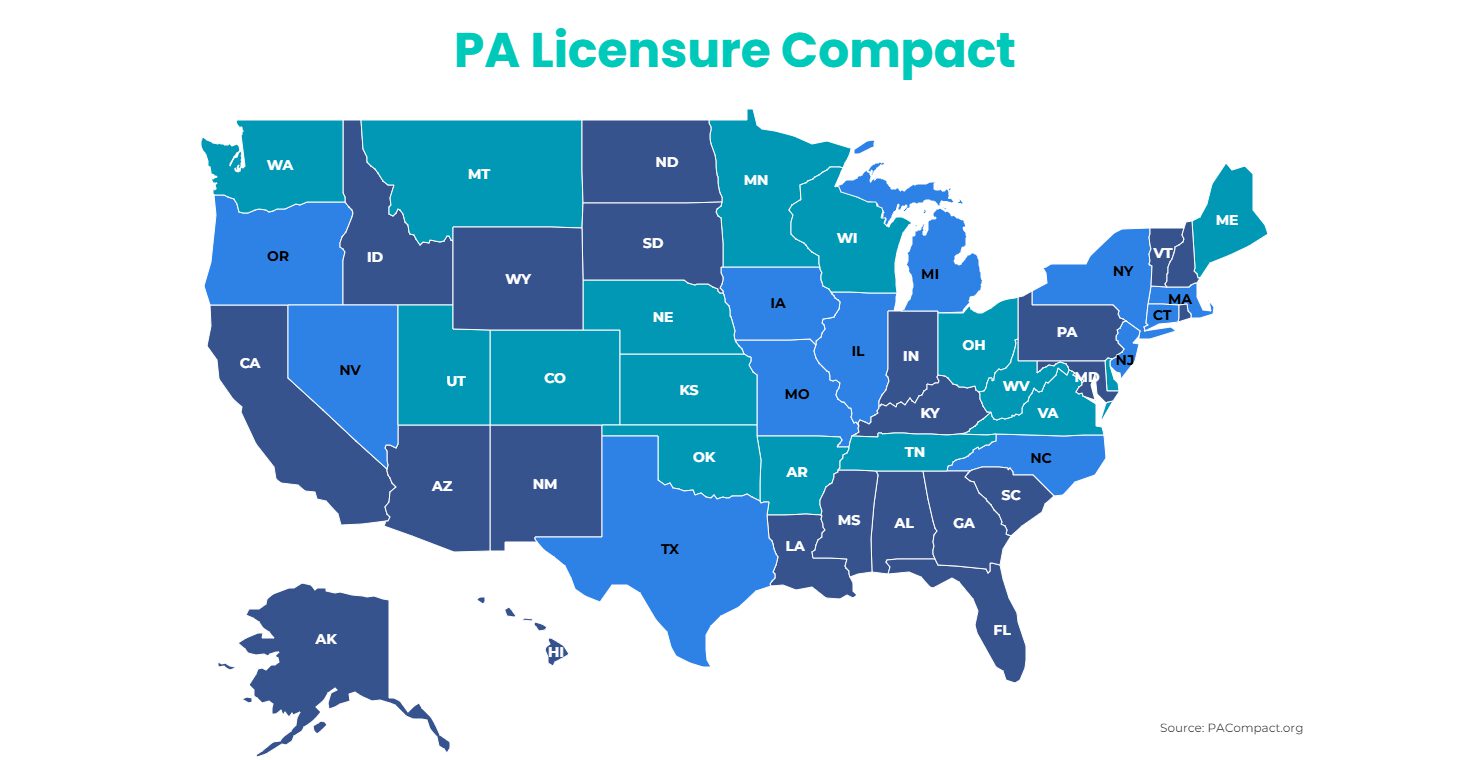
In short…
- A total of 36 states are Interstate Medical Licensure Compact (IMLC) members that serve as a State of Principal License (SPL) and are processing applications and issuing licenses.
- If a physician meets all IMLC requirements, the doctor’s SPL will issue a Letter of Qualification (LOQ).
- Barton Associates’ IMLC map gives physicians a quick look at IMLC states.
There’s a lot that goes into becoming a locum tenens physician—while you might have found a job that meets your personal needs and professional goals, the licensing process can often be a complex and time-consuming hurdle. But what if there was a way to simplify this process and expand your practice across multiple states with ease? Enter the Interstate Medical Licensure Compact (IMLC), a groundbreaking solution designed to streamline licensing for physicians on the move across the United States. In this comprehensive guide, we’ll dive deep into the IMLC, unraveling its complexities and showcasing its game-changing potential for doctors looking to provide care across state lines.
What is the Interstate Medical Licensure Compact (IMLC)?
The IMLC is a legal agreement between states that creates an accelerated route toward state licensure for physicians who want to travel across state lines to provide care to patients. Around 80% of physicians in the U.S. qualify for licensure through the IMLC, and it has become a main way for doctors—particularly locum tenens physicians—to easily gain practice authority in a different state.
The 2025 IMLC Map: Which states are in the IMLC?
As of August 2025, 36 states (as well as D.C. and Guam) are IMLC members that serve as State of Principal License (SPL) for physicians, meaning physicians who are licensed in these states can apply for medical licensure in another compact state. The remaining states are in varying stages of IMLC implementation, as illustrated by our IMLC map:
How does a physician get a license through the IMLC?
The process for obtaining a physician license in another state through the IMLC is quite simple, given you already have a valid medical license in an IMLC member state that can serve as a State of Principal License (SPL) and you meet the compact requirements.
Requirements for Physicians Seeking IMLC Licensure
To be licensed through the IMLC, you must hold a full, unrestricted medical license in a member state—this state will act as your State of Principal License (SPL), which essentially means this state is your “home base.” When designating your SPL, you must meet at least one of the following criteria:
- Your primary residence is in the SPL
- At least 25% of your practice of medicine takes place in your SPL
- You’re employed to practice medicine by an entity in your SPL
- The SPL is your state of residence for federal income tax purposes
In addition, you will be required to:
- Hold a degree from an accredited medical school, or a school listed in the International Medical Education Directory
- Successfully complete a graduate medical education program accredited by the Accreditation Council for Graduate Medical Education (ACGME) or American Osteopathic Association (AOA).
- Have passed each component of the USMLE, COMLEX-USA, or equivalent in no more than three attempts.
- Hold a current specialty certification or time-unlimited certification by an American Board of Medical Specialties (ABMS) or American Osteopathic Association Bureau of Osteopathic Specialists (AOABOS) board.
- Have no history of disciplinary actions toward your medical license.
- Have no criminal history.
- Have no history of controlled substance actions toward your medical license.
- Not be under active investigation.
Not all states can currently serve as your SPL, so see our IMLC map above or visit the IMLC’s website for a current list.
How to Apply for an IMLC License
The process for applying to obtain a medical license through IMLC (which must be done through the IMLC’s website) is composed of a few steps:
- Head to the IMLC’s website
- Give demographic and professional information and select your SPL
- Pay a non-refundable administration fee of $700
- Submit fingerprints to a designated criminal justice agency in your SPL for a criminal background check
After you’ve completed these steps, your application is then sent to the medical licensing agency in your SPL. If you meet all the requirements, your SPL will issue you a Letter of Qualification (LOQ), which is essentially your ticket to participating in the compact.
Obtaining Licenses in Additional States
After you’ve been issued an LOQ, you’ll then select the IMLC states in which you want to be licensed. Once these states receive your LOQ, you’ll be issued a license. While Barton Associates does not cover the initial $700 application fee, Barton will cover the cost of your additional IMLC licenses if you take assignments there.
This is great news for Barton locums, because during the 365 days that the LOQ is active there is typically an additional processing fee of $100 per state payable to the IMLC, which our licensing team will pay on your behalf. Once a license is issued, you do not need a current LOQ for renewal.
Once you obtain your new license, you will still have to renew each state as it expires, pay the appropriate fees, and meet any state-specific requirements such as CME, etc. If you are actively working with Barton, our licensing team will pay those fees and take care of renewing your license for you. It’s really that simple!
The Barton licensing team can also obtain new licenses for you without an assignment, with an additional licensing agreement. For more information on licensing and your options, contact your recruiter.
Find Locum Tenens Physician Jobs with Barton Associates
At Barton Associates, we have locum tenens physician jobs in all 50 states, meaning you can put your IMLC licenses to use.
Want to start your locum tenens journey? Check out our job board for exclusive opportunities and apply today.
This was originally written by Kurt Ullman in 2021 and was updated by Liliana French in 2024 and by Mike Connors in August 2025.


